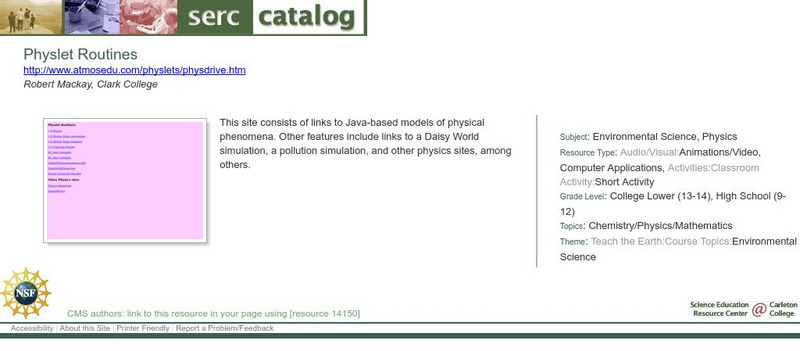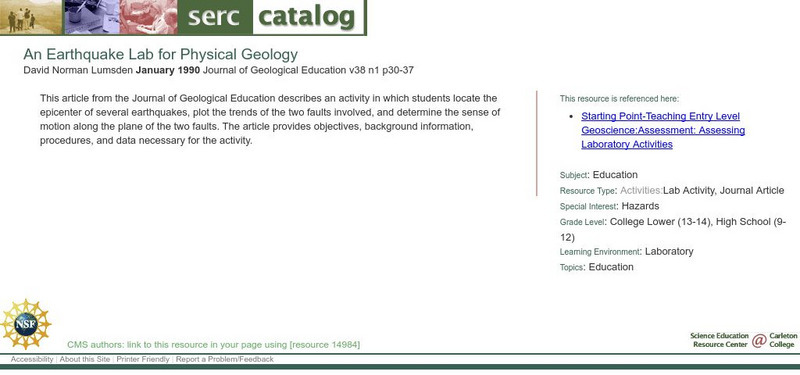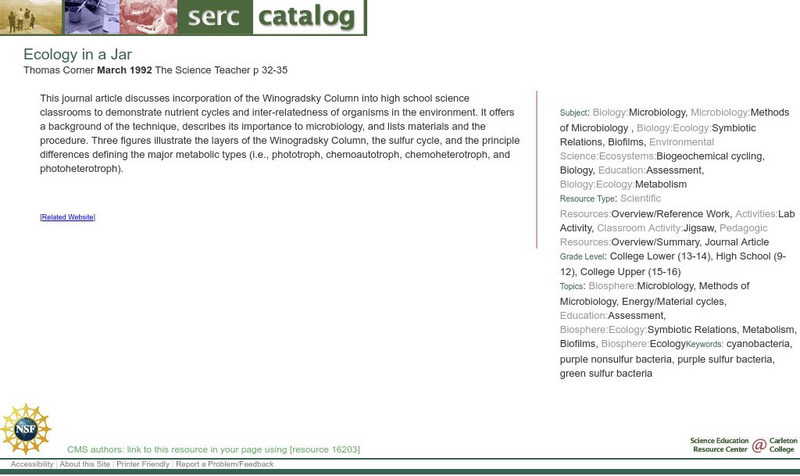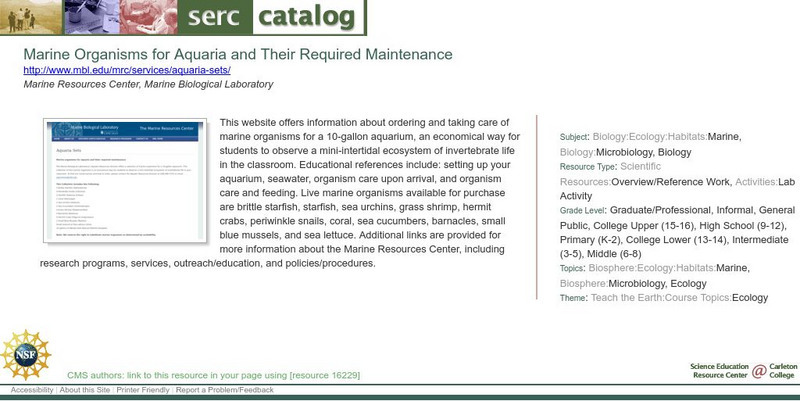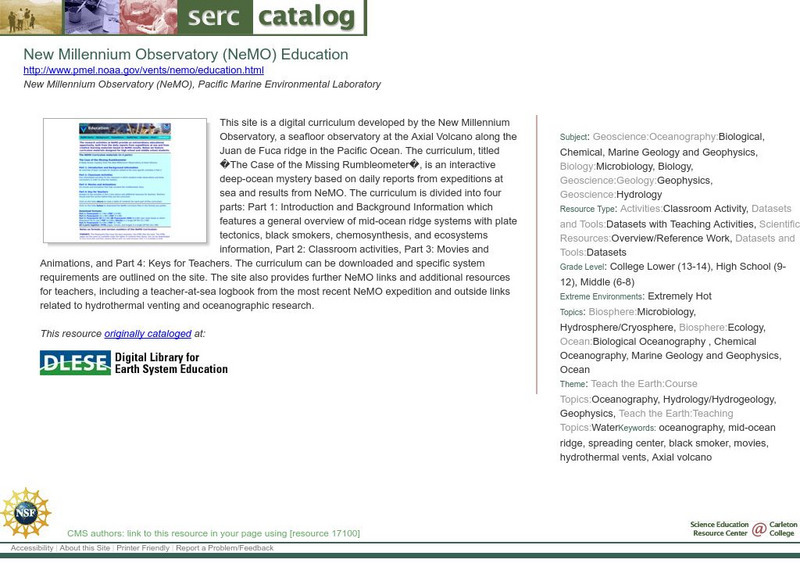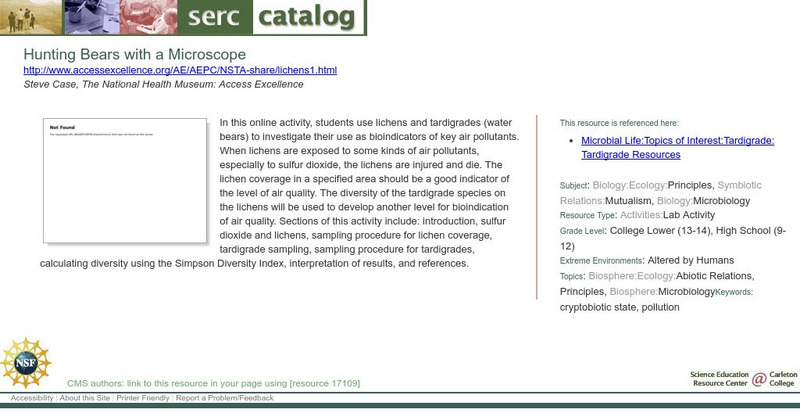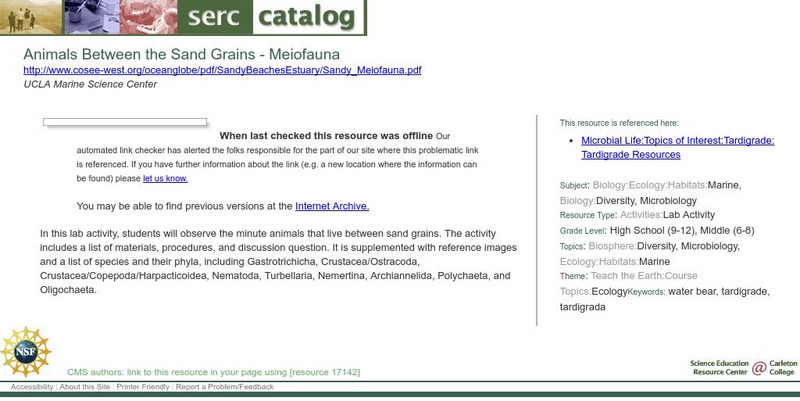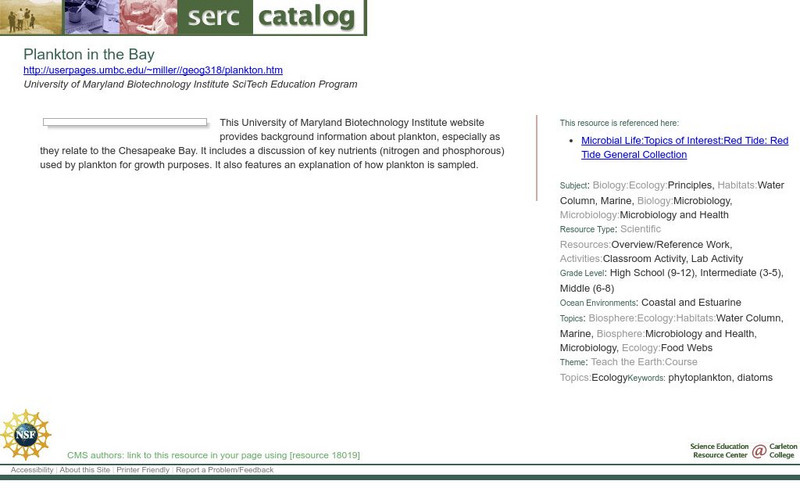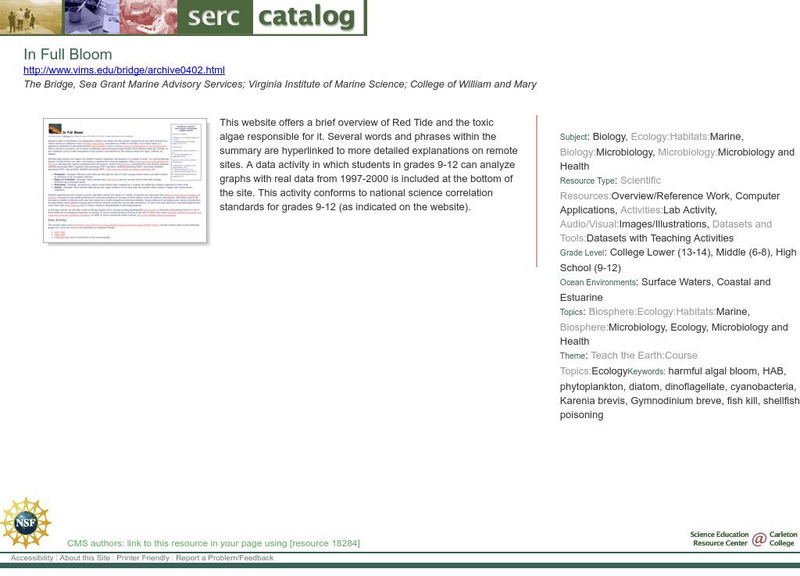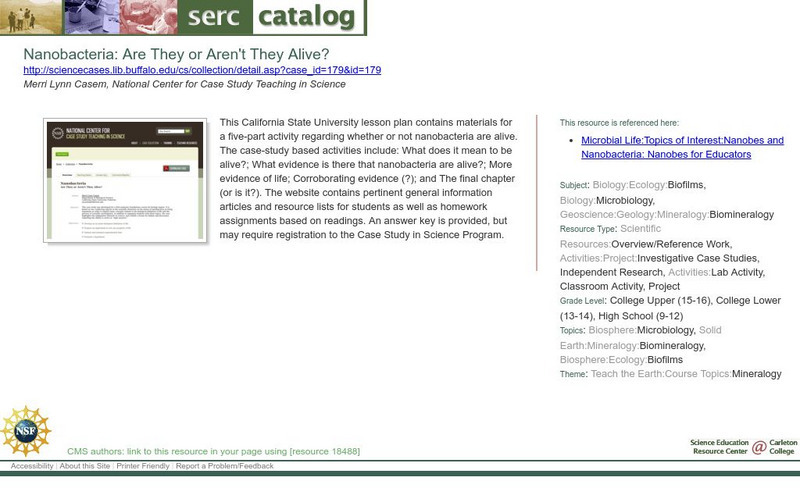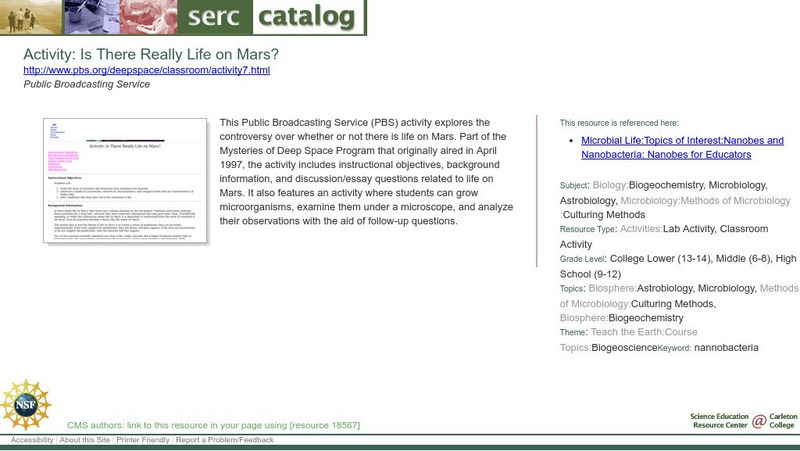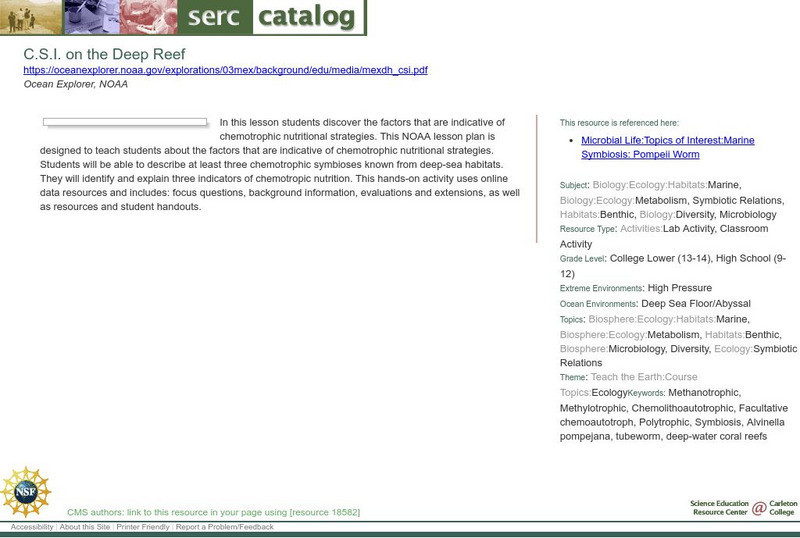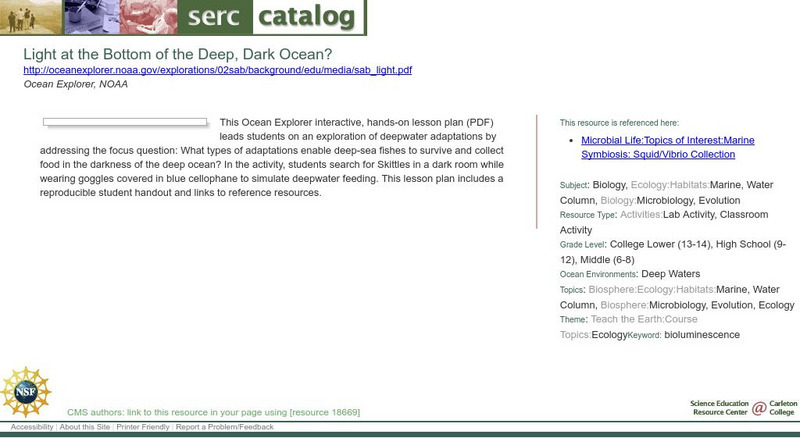Science Education Resource Center at Carleton College
Serc: Physlet Routines
A collection of Java-based models of physical phenomena. Other features include links to a Daisy World simulation, a pollution simulation, and other physics sites.
Science Education Resource Center at Carleton College
Serc: Map and Compass Lab
Science Scope article presents an activity on topography and land masses that helps students learn about scientific inquiry. Students also practice making and interpreting scale drawings and learning about computation, estimation and new...
Science Education Resource Center at Carleton College
Serc: Bio Media Associates: Learning Programs for Biology
This site provides photographs, animations, essays, teaching resources, multimedia, and other information about biological systems and organisms. It features a monthly contest and quiz in which students and teachers identify a mystery...
Science Education Resource Center at Carleton College
Serc: An Earthquake Lab for Physical Geology
This article from the Journal of Geological Education describes an activity in which students locate the epicenter of several earthquakes, plot the trends of the two faults involved, and determine the sense of motion along the plane of...
Science Education Resource Center at Carleton College
Serc: Biofilms: Online Manual
This on-line collection of exercises can be conducted to illustrate the formation and properties of microbial biofilms. Activities include: A Biofilm Primer, An Interesting Paradox, Build a Biofilm Reactor, Bring 'em Back Alive, Buccal...
Science Education Resource Center at Carleton College
Serc: Microbial Communities
This 1986 journal article reports that most microbial communities have escaped description. Article covers communities and ecosystems, microbial communities in termite intestines, microbial mats in evaporite flats, and microbial...
Science Education Resource Center at Carleton College
Serc: Ecology in a Jar
This journal article discusses incorporation of the Winogradsky Column into high school science classrooms to demonstrate nutrient cycles and inter-relatedness of organisms in the environment.
Science Education Resource Center at Carleton College
Serc: Marine Organisms for Aquaria and Their Required Maintenance
What can you do with an ocean animal aquarium in your classroom? This website offers information about ordering, setting up, and taking care of marine organisms for a 10-gallon aquarium which is a great way for students to observe a...
Science Education Resource Center at Carleton College
Serc: Water Sheds and Water Quality
Included here is a collection of activities to teach young scholars about watersheds and pollution.
Science Education Resource Center at Carleton College
Serc: New Millennium Observatory (Ne Mo) Education
This digital curriculum is an interactive deep-ocean mystery based on daily reports from expeditions at sea and results from NeMO and consists of four parts: Introduction and Background Information, Classroom activities, Movies and...
Science Education Resource Center at Carleton College
Serc: Hunting Bears With a Microscope
In this study, students will use lichens and tardigrades (water bears) to investigate their use as bioindicators of key air pollutants.
Science Education Resource Center at Carleton College
Serc: Life in Extreme Environments: Who Is on Top in the Food Chain?
In this lesson, students will design experiments to gain some understanding of the feeding rates of Rotifers and/or Tardigrades. They will use organisms collected locally or provided by the teacher to explore differences between their...
Science Education Resource Center at Carleton College
Serc: Animals Between the Sand Grains Meiofauna
In this lab activity, students will observe the minute animals that live between sand grains. The activity includes a list of materials, procedures, and discussion question. It is supplemented with reference images and a list of species...
Science Education Resource Center at Carleton College
Serc: Dive and Discover: Expeditions to the Seafloor
Dive and Discover immerses you into the world of ocean exploration. Through stories, photos, and videos go on board research expeditions that use deep-sea tools and vehicles, and become part of teams of researchers making new discoveries.
Science Education Resource Center at Carleton College
Serc: Plankton in the Bay
Students will learn about plankton in relation to the Chesapeake Bay and how they grow and are sampled.
Science Education Resource Center at Carleton College
Serc: In Full Bloom
Learners compare concentrations of harmful algal blooms using NOAA's Coastal Services Center Harmful Algal Bloom Forecasting (HABF) Project data.
Science Education Resource Center at Carleton College
Serc: Help! It's an Hab!
A series of lessons that provide information and materials to teach students about the effects of harmful algal blooms on fish as well as devising remediation techniques.
Science Education Resource Center at Carleton College
Serc: Black Smokers: Life Forms
This educational web site features life forms of deep sea hydrothermal systems. Hosted by the American Museum of Natural History, this site offers a brief introduction of the community and then focuses on Vestimentiferan tube worms,...
Science Education Resource Center at Carleton College
Serc: Nanobacteria: Are They or Aren't They Alive?
In this five-part activity, students will learn whether or not nanobacteria are alive.
Science Education Resource Center at Carleton College
Serc: Activity: Is There Really Life on Mars?
This Public Broadcasting Service (PBS) activity explores the controversy over whether or not there is life on Mars. Part of the Mysteries of Deep Space Program that originally aired in April 1997, the activity includes instructional...
Science Education Resource Center at Carleton College
Serc: c.s.i. On the Deep Reef
For this lesson students discover the factors that are indicative of chemotrophic nutritional strategies. This NOAA lesson plan is designed to teach students about the factors that are indicative of chemotrophic nutritional strategies....
Science Education Resource Center at Carleton College
Serc: Aboard Alvin
This Gulf of Maine educational website takes students aboard the submersible Alvin. It includes informational pages such as a project overview, as well as pages about Alvin, hydrothermal vents, and the researchers involved in the...
Science Education Resource Center at Carleton College
Serc: Who Has the Light?
This lesson explores bioluminescence. Discover which deep-sea organisms are capable of bioluminescence, and how this ability benefits these organisms. In this activity, students compare and contrast chemiluminescence, bioluminescence,...
Science Education Resource Center at Carleton College
Serc: Light at the Bottom of the Deep, Dark Ocean?
What types of adaptations enable deep-sea fishes to survive and collect food in the darkness of the deep ocean? Interactive, hands-on lesson plan takes students on an exploration of deepwater adaptations by searching for Skittles in a...


